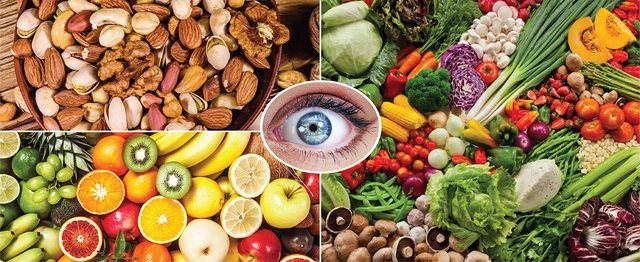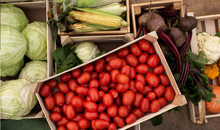
 Flash News
Flash News
Gunfire in Durres, a 30-year-old man is injured
Accident on Arbri Street, car goes off the road, two injured
Arrests of "Bankers Petrolium", Prosecution provides details: Exported and sold 532 billion lek of oil, caused millions of euros in damage to the state
Ndahet nga jeta tragjikisht në moshën 28-vjeçare ylli i Liverpool, Diogo Jota
Posta e mëngjesit/ Me 2 rreshta: Çfarë pati rëndësi dje në Shqipëri
Improve eye health, 10 foods you should definitely add to your daily meals

The eyes are our window to the world, and yet, we often take them for granted, especially if we are among those lucky enough to have “strong eyes.” However, like any other organ, the eyes are vulnerable to damage, especially in today’s age of screens.
From cell phones to laptops, everyday life isn't exactly "friendly" to our eyes. Fortunately, a properly structured diet can protect vision and delay age-related deterioration.
And no, it's not just carrots that are the protagonist. There are many foods rich in nutrients that the eyes love, such as beta-carotene, omega-3 fatty acids, vitamins C, A and E, as well as minerals like zinc.
All of this helps prevent conditions such as cataracts, macular degeneration, glaucoma, and dry eye syndrome.
Check out the top 10 foods to add to your supermarket shopping list this week below:
1. Sweet potatoes
Carrots may have the eyesight "brand," but sweet potatoes may be even stronger. Rich in beta-carotene, which converts to vitamin A, they help maintain corneal health.
A medium sweet potato covers over 150% of the recommended daily dose of vitamin A. Fry it with olive oil and rosemary or make a velvety soup with carrots, ginger and turmeric.
2. Green leafy vegetables
Spinach, kale, lettuce, Swiss chard, and collard greens are full of lutein and zeaxanthin – antioxidants that filter blue light, protect eye cells, and slow diseases like cataracts and macular degeneration.
Eat them raw in salads, lightly fry them, or steam them to preserve nutrients.
3. Eggs
Egg yolks are an excellent source of lutein and zeaxanthin, as well as omega-3 fats. Eggs help prevent macular degeneration, a degenerative disease of the retina.
Research in Australia showed that those who eat 2-4 eggs a week are 49% less likely to develop it. Try scrambles for breakfast or shakshuka for dinner.
4. Salmon
Rich in omega-3, salmon is a major ally for eye health. If you don't want to eat it every day, try at least twice a week.
Sardines, mackerel, trout and tuna are also good sources. Eat them grilled, pan-fried or raw in sashimi with wasabi and shiso leaves.
5. Almonds
A handful of almonds gives you a lot of vitamin E, which neutralizes free radicals and limits oxidative damage to the eyes – something very important if you live in the city or smoke. Eat them plain or add them to yogurt, salads, risottos or soups.
6. Blueberries
Blueberries are a superfood not just for your eyes but for your entire body. They contain anthocyanins, antioxidants that increase circulation to your eyes and help regenerate retinal cells, which are responsible for night vision. Eat them with yogurt, put them in smoothies, or add them to chia pudding.
7. Peppers
Red, yellow, or orange bell peppers are full of vitamin C, which supports eye and optic nerve health. They also contain zeaxanthin, vitamins A, and E. Eat them raw for maximum nutritional value, with hummus, guacamole, or baba ganoush.
8. Dark chocolate
Yes, chocolate has a place here too. Dark chocolate with at least 70% cocoa contains flavonoids that improve blood flow to the eyes and promote the health of the cornea and lens. Enjoy a small piece after a meal or rub a little into yogurt.
9. Mussels
Zinc is essential for retinal health and appears to delay macular degeneration, especially when combined with antioxidants. Mussels are one of the richest sources of zinc. If you don't like them, you can find them in poultry, lean meats, legumes, nuts, and seeds.
10. Parsley
We usually add it for decoration, but parsley is full of eye-protecting nutrients: beta-carotene, lutein, and zeaxanthin. All of which increase macular density and reduce the risk of age-related eye diseases.
Add it to smoothies, over salads or fish dishes, or mix into ceviche for a refreshing touch.
Latest news










Greece imposes fee to visit Santorini, how many euros tourists must pay
2025-07-03 20:50:37
Don't make fun of the highlanders, Elisa!
2025-07-03 20:43:43
Gunfire in Durres, a 30-year-old man is injured
2025-07-03 20:30:52

The recount in Fier cast doubt on the integrity of the vote
2025-07-03 20:09:03




Heatwave has left at least 9 dead this week in Europe
2025-07-03 19:00:01

Oil exploitation, Bankers accused of 20-year fraud scheme
2025-07-03 18:33:52
Three drinks that make you sweat less in the summer
2025-07-03 18:19:35
What we know so far about the deaths of Diogo Jota and his brother André Silva
2025-07-03 18:01:56



Another heat wave is expected to grip Europe
2025-07-03 17:10:58

Accident on Arbri Street, car goes off the road, two injured
2025-07-03 16:45:27

Accused of two murders, England says "NO" to Ilirjan Zeqaj's extradition
2025-07-03 16:25:05





Gaza rescue teams: Israeli forces killed 25 people, 12 in shelters
2025-07-03 15:08:43
Diddy's trial ends, producer denied bail
2025-07-03 15:02:41

Agricultural production costs are rising rapidly, 4.8% in 2024
2025-07-03 14:55:13
Warning signs of poor blood circulation
2025-07-03 14:49:47
Croatia recommends its citizens not to travel to Serbia
2025-07-03 14:31:19
Berisha: Albania is the blackest stain in Europe for the export of emigrants
2025-07-03 14:20:19


'Ministry of Smoke': Activists Blame Government for Wasteland Fires
2025-07-03 13:59:09

AFF message of condolences for the tragic loss of Diogo Jota and his brother
2025-07-03 13:41:36
Five healthy foods you should add to your diet
2025-07-03 13:30:19






A unique summer season, full of rhythm and rewards for Credins bank customers!
2025-07-03 12:12:20

Fire situation in the country, 29 fires reported in 24 hours
2025-07-03 12:00:04
The constitution of the Kosovo Assembly fails for the 41st time
2025-07-03 11:59:57
The gendering of politics
2025-07-03 11:48:36

The price we pay after the "elections"
2025-07-03 11:25:39

Xhafa: The fire at the Elbasan landfill was deliberately lit to destroy evidence
2025-07-03 11:08:43

The 3 zodiac signs that will have financial growth during July
2025-07-03 10:48:01
Democratic MP talks about the incinerator, Spiropali turns off her microphone
2025-07-03 10:39:24

Ndahet nga jeta tragjikisht në moshën 28-vjeçare ylli i Liverpool, Diogo Jota
2025-07-03 10:21:03
Cocaine trafficking network in Greece, including Albanians, uncovered
2025-07-03 10:10:12



Korreshi: Election manipulation began long before the voting date
2025-07-03 09:39:13
Arrest of Greek customs officer 'paralyzes' vehicle traffic at Qafë Botë
2025-07-03 09:28:41
After Tirana and Fier, the boxes are opened in Durrës today
2025-07-03 09:21:10
Enea Mihaj transfers to the USA, will play as an opponent of Messi and Uzun
2025-07-03 09:10:04

Foreign exchange, the rate at which foreign currencies are sold and bought
2025-07-03 08:53:50
Index, Albania has the worst quality of life in Europe
2025-07-03 08:48:10


Horoscope, what do the stars have in store for you today?
2025-07-03 08:17:05
Clear weather and high temperatures, here's the forecast for this Thursday
2025-07-03 08:00:37
Posta e mëngjesit/ Me 2 rreshta: Çfarë pati rëndësi dje në Shqipëri
2025-07-03 07:46:48



Lufta në Gaza/ Pse Netanyahu do vetëm një armëpushim 60-ditor, jo të përhershëm?
2025-07-02 21:56:08
US suspends some military aid to Ukraine
2025-07-02 21:40:55



Methadone shortage, users return to heroin: We steal to buy it
2025-07-02 20:57:35
Government enters oil market, Rama: New price for consumers
2025-07-02 20:43:30
WHO calls for 50% price hike for tobacco, alcohol and sugary drinks
2025-07-02 20:41:53



